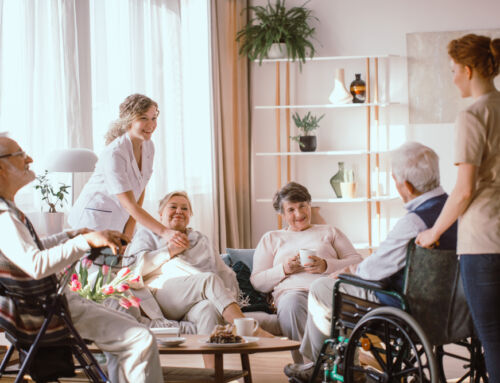March is National Nutrition Month. Created by the Academy of Nutrition and Dietetics, this annual campaign puts a spotlight on the importance of making informed choices about food and developing healthy habits around eating and physical activity.
When it comes to proper nutrition for older people, it’s important that their loved ones be attuned to their diet and, if concerns about their nutrition arise, be proactive in addressing them. Observe their eating habits, take note of unintended weight gain or loss, and be sure you understand how the medicines your loved one takes might impact their weight, appetite, or nutrient absorption.
A senior weight epidemic
As you probably have heard (and seen), many Americans’ waistlines are steadily expanding…including seniors’. According to 2014 data from the Centers for Disease Control and Prevention, 38.5 percent of adults aged 60 and over are considered obese (with a body mass index [BMI] greater than 30). That number includes 37.5 percent of older men and 39.4 percent of older women, and those percentages have been trending upward in recent years. This extra weight contributes to numerous health issues including high blood pressure, diabetes, heart disease, and even certain types of cancer.
And there is another often-overlooked weight-related issue in our “super-sized” nation known for overeating. Looking at more CDC statistics from recent years, the number of people age 60 to 74 who are underweight—with a BMI under 18.5 or a weight 15 to 20 percent below normal for their age and height group—also has been increasing. In 2007, 0.9 percent of this age demographic was underweight, then it went up to 1.2 percent in 2010, and the most recent stats from 2014 have the number at 1.7 percent of seniors who are underweight.
The road to unhealthy weight in seniors
There are a variety of reasons that can explain the prevalence of these weight extremes among the senior population including medical, social, and mental health issues.
For the many overweight or obese seniors:
- Health problems, such as an underactive thyroid or depression, may be the root issue. The hormonal changes that accompany menopause cause weight gain for many women. And medicines used to treat many age-related health woes can also cause seniors to gain weight, for example steroids for arthritis or insulin for diabetes.
- People often become less active as they get older. A loss of muscle mass can mean an older person will burn fewer calories, though they may continue to eat and drink as they always have, resulting in weight gain.
- Some seniors can’t afford healthy, nutrient-rich foods like fresh produce and lean meats, which tend to be more expensive than less healthy foods. Additionally, since many seniors don’t drive, it can be difficult to access fresher foods (compared to less healthy packaged foods that can be stored for long periods).
- Social isolation and loneliness leads some people to eat more as a way to self-soothe and deal with boredom.
For those who are underweight:
- Again, health problems, such as dementia, depression, or dental issues can result in a decreased appetite. Age-related health conditions that cause difficulty with activities of daily living (ADLs) like food preparation and eating can also cause weight loss. Other possible factors include chronic illness and use of certain medicines.
- Special diets that limit things like salt, fat, or sugar may lead to inadequate nutrient intake for some older people.
- Once again, some seniors simply can’t afford groceries, especially nutrient-rich foods. And because many seniors do not drive, access to healthy food may be even more logistically challenging.
- Older adults who eat alone might not enjoy mealtime as much as they used to, causing them to lose interest in cooking and eating.
On top of these, there’s another issue that can contribute to unhealthy weight extremes in seniors. There are 2.5 million older adults with an alcohol or drug problem, and widowers over the age of 75 have the highest rate of alcoholism in the U.S., according to The National Council on Alcoholism and Drug Dependence. Alcoholism can interfere with digestion and absorption of nutrients, and nutrition also will suffer if alcohol is substituted for meals.
>> Related: The Senior Loneliness Epidemic & Solutions to “Cure” It
The health costs of a poor diet
Whether a senior is over- or underweight, there are multiple potential health consequences of poor nutrition in older people, among them:
- An increased risk for cardiovascular issues, diabetes, and even cancer
- A weakened immune system, increasing the risk of infections
- Poor wound-healing
- Weak muscles and reduced bone mass, which can lead to falls and fractures
- A higher rate of hospitalization, which in turn exposes the patient to potential infections
Solutions to improper senior nutrition
If you are concerned about a loved one’s diet, there are several ways to address some of the common causes of weight-related issues.
- Talk to their doctor to see if there is a medical explanation to the senior’s weight gain or loss and look for solutions to address it (such as alternatives to medicines). Ask if a nutritional supplement may be beneficial for them.
- If dental issues are causing a loved one to omit certain foods or skip meals, talk to their dentist about restoration options like bridges or dentures.
- Make meals and snacks count by incorporating high-nutrient foods. Put nut butter on toast or fruit. Add kale and whole milk yogurt into a fruit smoothie.
- Give foods in a restricted diet an extra flavor boost by using spices or lemon juice.
- Help cut coupons or find specials and sales on healthy, nutritious foods in the weekly grocery flyers.
- If your loved one lives alone or in a care facility, visit during mealtimes in order to make eating a social occasion.
- Encourage your loved one to stay active in order to burn excess calories and maintain muscle mass. Offer to meet them for a brisk walk or swim a few times a week…you’ll both benefit!
>> Related: Boomers Can Achieve Better Health with Super Foods
If you are still concerned about your loved one’s weight, it may be worthwhile to seek outside assistance from a professional. If the person lives alone, you may consider hiring a home health aide who can help with activities of daily living (ADLs) like shopping, healthy meal preparation, and feeding, if needed. There also are nurses, social workers, and registered dieticians who make house calls to provide guidance on proper nutrition and eating habits. Community organizations like Meals on Wheels can even deliver healthy meals right to seniors’ doorstep.
How CCRCs solve nutrition concerns
For seniors who live in a continuing care retirement community (CCRC, or life plan community) or another type of retirement community, there are likely even more helpful resources available to proactively address concerns around proper nutrition. A CCRC provides residents with a minimum of one meal per day for those in independent living residences, with meal plans offered for up to three meals a day, depending on the resident’s wishes and level of independence.
>> Related: Food for Thought: How CCRC Meal Plans Work
Another benefit of living in a CCRC when it comes to senior nutrition is that, if desired by the resident, mealtime can double as social time. Within the community’s dining facilities, there are typically tables of various sizes to accommodate any number of people. Residents can choose whether to eat solo or join a group at a larger table for a more social dining experience. Additionally, many communities offer alternatives to the traditional “dining hall” such as more casual bistros, pubs, or coffee shops.
Many CCRCs also work closely with on-staff dietitians to address residents’ specific dietary requirements, ensuring that all residents are provided with healthy, nutritious food options. (Some communities are better than others at making accommodations for special diets, so be sure to ask about this at the CCRCs you are considering.) If further support is needed with ADLs like preparing meals or help with eating, a continuum of assisted living services is provided on-site, and skilled nursing care with physician oversight is also available if there is a medical issue at the root of the resident’s excess or inadequate weight.
Food for thought
As the saying goes, we are what we eat, and for seniors, it is especially important that they consume the proper amount of nutrient-rich foods to keep them at their optimal weight to bolster their overall health and keep them thriving. If you are concerned about your own weight or eating habits, or those of a loved one, there are several options to consider, but the best first step is to talk with a doctor.






